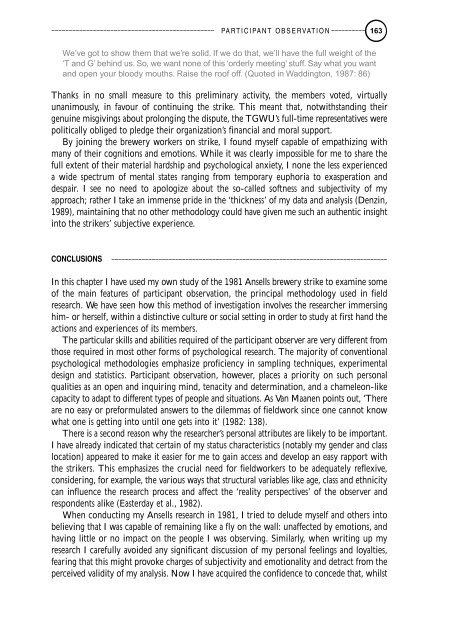essential-guide-to-qualitative-in-organizational-research
essential-guide-to-qualitative-in-organizational-research
essential-guide-to-qualitative-in-organizational-research
- No tags were found...
Create successful ePaper yourself
Turn your PDF publications into a flip-book with our unique Google optimized e-Paper software.
––––––––––––––––––––––––––––––––––––––––––––––– PARTICIPANT OBSERVATION–––––––––– 163We’ve got <strong>to</strong> show them that we’re solid. If we do that, we’ll have the full weight of the‘T and G’ beh<strong>in</strong>d us. So, we want none of this ‘orderly meet<strong>in</strong>g’ stuff. Say what you wantand open your bloody mouths. Raise the roof off. (Quoted <strong>in</strong> Wadd<strong>in</strong>g<strong>to</strong>n, 1987: 86)Thanks <strong>in</strong> no small measure <strong>to</strong> this prelim<strong>in</strong>ary activity, the members voted, virtuallyunanimously, <strong>in</strong> favour of cont<strong>in</strong>u<strong>in</strong>g the strike. This meant that, notwithstand<strong>in</strong>g theirgenu<strong>in</strong>e misgiv<strong>in</strong>gs about prolong<strong>in</strong>g the dispute, the TGWU’s full-time representatives werepolitically obliged <strong>to</strong> pledge their organization’s f<strong>in</strong>ancial and moral support.By jo<strong>in</strong><strong>in</strong>g the brewery workers on strike, I found myself capable of empathiz<strong>in</strong>g withmany of their cognitions and emotions. While it was clearly impossible for me <strong>to</strong> share thefull extent of their material hardship and psychological anxiety, I none the less experienceda wide spectrum of mental states rang<strong>in</strong>g from temporary euphoria <strong>to</strong> exasperation anddespair. I see no need <strong>to</strong> apologize about the so-called softness and subjectivity of myapproach; rather I take an immense pride <strong>in</strong> the ‘thickness’ of my data and analysis (Denz<strong>in</strong>,1989), ma<strong>in</strong>ta<strong>in</strong><strong>in</strong>g that no other methodology could have given me such an authentic <strong>in</strong>sight<strong>in</strong><strong>to</strong> the strikers’ subjective experience.CONCLUSIONS ––––––––––––––––––––––––––––––––––––––––––––––––––––––––––––––––––––––––––––––––––In this chapter I have used my own study of the 1981 Ansells brewery strike <strong>to</strong> exam<strong>in</strong>e someof the ma<strong>in</strong> features of participant observation, the pr<strong>in</strong>cipal methodology used <strong>in</strong> field<strong>research</strong>. We have seen how this method of <strong>in</strong>vestigation <strong>in</strong>volves the <strong>research</strong>er immers<strong>in</strong>ghim- or herself, with<strong>in</strong> a dist<strong>in</strong>ctive culture or social sett<strong>in</strong>g <strong>in</strong> order <strong>to</strong> study at first hand theactions and experiences of its members.The particular skills and abilities required of the participant observer are very different fromthose required <strong>in</strong> most other forms of psychological <strong>research</strong>. The majority of conventionalpsychological methodologies emphasize proficiency <strong>in</strong> sampl<strong>in</strong>g techniques, experimentaldesign and statistics. Participant observation, however, places a priority on such personalqualities as an open and <strong>in</strong>quir<strong>in</strong>g m<strong>in</strong>d, tenacity and determ<strong>in</strong>ation, and a chameleon-likecapacity <strong>to</strong> adapt <strong>to</strong> different types of people and situations. As Van Maanen po<strong>in</strong>ts out, ‘Thereare no easy or preformulated answers <strong>to</strong> the dilemmas of fieldwork s<strong>in</strong>ce one cannot knowwhat one is gett<strong>in</strong>g <strong>in</strong><strong>to</strong> until one gets <strong>in</strong><strong>to</strong> it’ (1982: 138).There is a second reason why the <strong>research</strong>er’s personal attributes are likely <strong>to</strong> be important.I have already <strong>in</strong>dicated that certa<strong>in</strong> of my status characteristics (notably my gender and classlocation) appeared <strong>to</strong> make it easier for me <strong>to</strong> ga<strong>in</strong> access and develop an easy rapport withthe strikers. This emphasizes the crucial need for fieldworkers <strong>to</strong> be adequately reflexive,consider<strong>in</strong>g, for example, the various ways that structural variables like age, class and ethnicitycan <strong>in</strong>fluence the <strong>research</strong> process and affect the ‘reality perspectives’ of the observer andrespondents alike (Easterday et al., 1982).When conduct<strong>in</strong>g my Ansells <strong>research</strong> <strong>in</strong> 1981, I tried <strong>to</strong> delude myself and others <strong>in</strong><strong>to</strong>believ<strong>in</strong>g that I was capable of rema<strong>in</strong><strong>in</strong>g like a fly on the wall: unaffected by emotions, andhav<strong>in</strong>g little or no impact on the people I was observ<strong>in</strong>g. Similarly, when writ<strong>in</strong>g up my<strong>research</strong> I carefully avoided any significant discussion of my personal feel<strong>in</strong>gs and loyalties,fear<strong>in</strong>g that this might provoke charges of subjectivity and emotionality and detract from theperceived validity of my analysis. Now I have acquired the confidence <strong>to</strong> concede that, whilst



